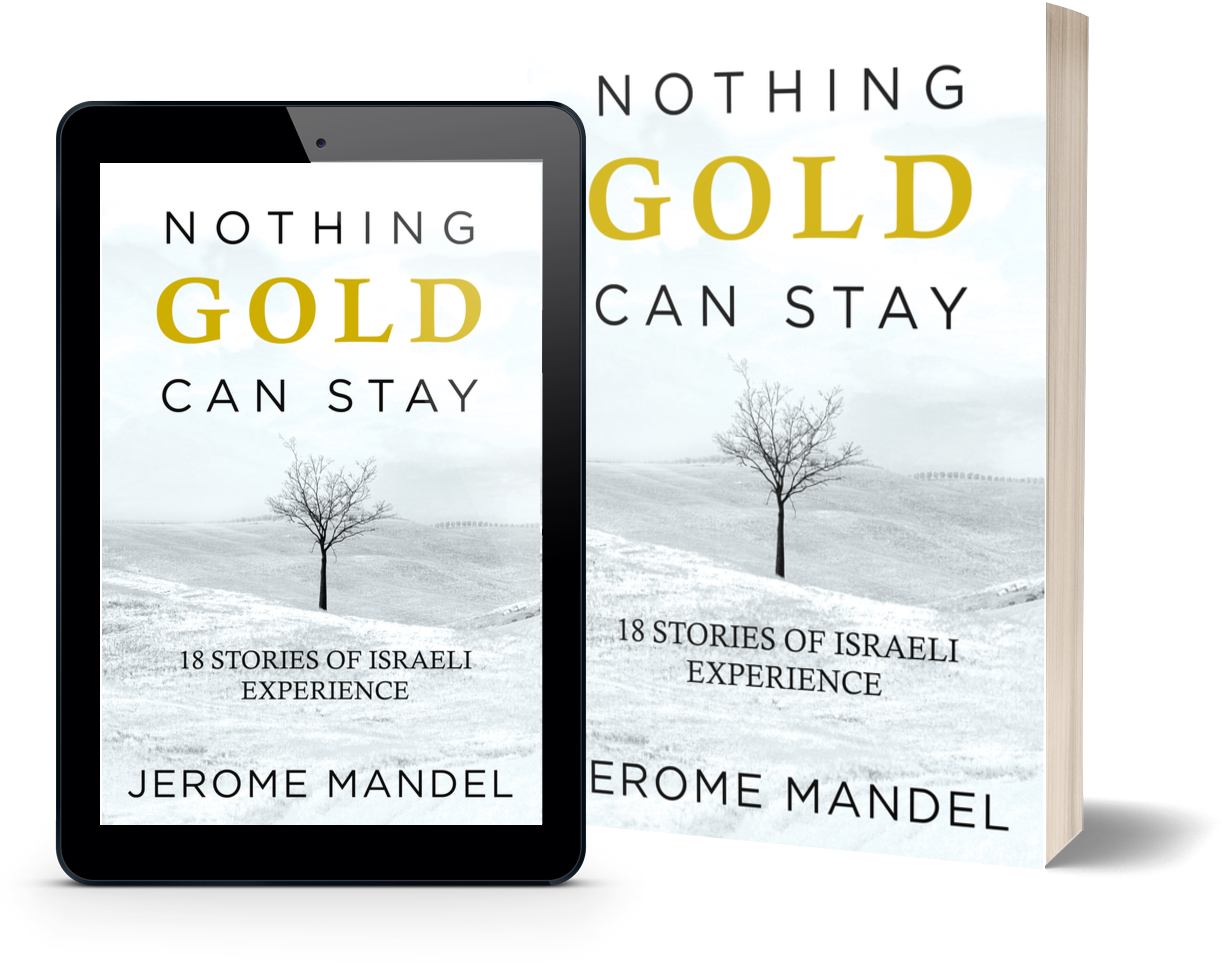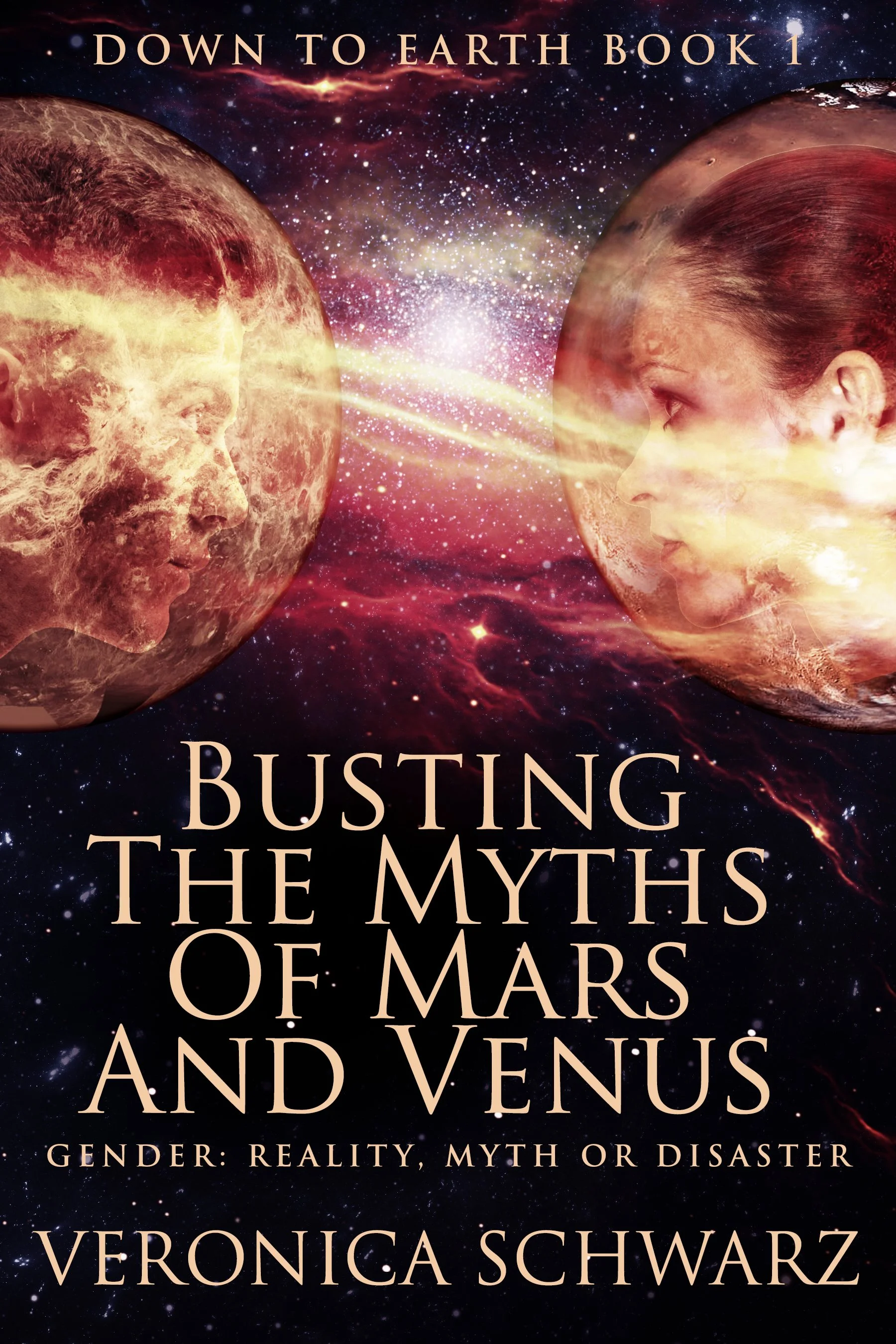Nothing Gold Can Stay
Book summary
"NOTHING GOLD CAN STAY" is a profound collection of stories exploring the defining moments in the lives of diverse characters. From a widowed mother rebuilding her life to an American family's visit to Auschwitz, each tale offers a unique perspective on the human condition. Jerome Mandel's evocative writing delves deep into self-discovery and resilience.
Excerpt from Nothing Gold Can Stay
The Present
Dina suddenly appeared in the door.
“Oskar Wiznicienski is here to see you,” she said. She could have used the intercom, but I encour-age the human touch. I closed the folder on my desk, information about random access memory, and put it away. I want my clients to remember that they are my only concern.
“Oskar!”
“Menachem!”
“Come in, sit down. You’re looking fine.”
He is a wiry man about the size of a leprechaun. His complexion is pink, healthy, his eyes almost mer-ry, and his energy quite daunting. But for a man as rich as he is—and I know to the penny how much he is worth—he dresses in surprisingly shabby clothes. Blue serge suit pants, vintage 1950s, with a shiny seat. A long-sleeved white shirt, even in summer, slightly frayed at the collar points. I’ve become accustomed to the eccentricities of the rich.
“Can I get you something to drink, Mr. Wiz-nicienski?”
“Is this on the account, Menachem?”
“No Oskar, it’s free.”
“Then I’ll have a glass of orange juice, Dina, not cold.”
“Menachem?”
“Coffee.”
“So, Menachem, I hear you’re going to Poland.”
“Yes. Germany first.”
“Germany?”
“It came as a surprise to me, too. The German embassy got in touch. The city of Freiburg invites everyone displaced by the war to return for a commem-orative visit, at their expense, and to dedicate a memorial.”
“I didn’t know you were a Freiburger.”
“That’s how I got out—through the Schwarzwald into Switzerland. And now Tova and I are going back for the first time in almost fifty years.”
“Wives too?”
“Everything. Airfare. Five-star hotel. Banquet with the mayor and city councilors in the Burgermeis-ter’s hall. All paid for by the German government and the city of Freiburg. A real gift. Completely unex-pected.”
“El Al?”
“No. Lufthansa—it’s part of the deal. Zürich first and then on to Freiburg. Tova is really quite excited about Zürich. Looking forward to the duty-free shopping. Swiss chocolates, cheese. You want me to bring you presents for your grandchildren too?”
“No. I don’t need you to buy anything for my grandchildren, but if you’re going on to Warsaw …”
“Yes, I am.”
“… there’s something you might do for me, if you have the time.”
“Of course. Anything.”
He laid five one-thousand dollar bills on the table.
“Give these to a man called Krysten Swoboda. If he’s still alive and you can find him. He must be in his middle eighties by now.”
“Who is he, a cousin? Still living there?”
“No. No relation. He took care of me during the war.”
“He must have treated you like a prince. What did he do, put you up in a villa on Lake Como?”
“Ha-ha! No. I hid in the forest. But I’ll tell you, Menachem, there’s not much to eat in the forest for a city boy. I couldn’t bring myself to eat grubs and worms. Could you? The birds were too fast and the small animals too clever. I ate nuts and roots mostly, some eggs I stole from chicken coops, fruit from or-chards. But mostly I starved.
Dina came in with the orange juice and coffee.
“Thank you, Dina.”
“Well, eventually they caught me not because I was a Jew but because I was a thief. Stole food from a peasant’s cart. They sent me to Sachsenhausen. That’s where I met Krysten Swoboda. Everyone knew who he was and he knew everyone. I arrived near the end of the war. No food. No medicine. And there was ty-phus in the camp. I worked. How I worked. But not even I am immune to the disease. I became ill and crawled into bed to die.”
I shifted in my chair. I didn’t want the coffee.
“There’s something familiar and comfortable about dying,” Oskar said. “Yes. You grow accustomed to the fever. The shivers make you smile. The pain in your guts is almost comfortable—I don’t know, because it’s not worse, maybe. That’s the point. It’s not un-endurable. It’s familiar. You lie there waiting, knowing you will either die or get better and there’s not much you can do one way or the other. And it re-ally doesn’t matter.”
“But you didn’t die.”
He smiled. “But I didn’t know that then,” he said, holding up a finger. “I thought I was going to die. I was waiting to die. And that’s when Krysten Swoboda came down the aisle between the bunks. I had spoken to him, maybe a day or two before. There wasn’t much light and he came slowly. When he got to my bunk, he stopped for a moment to make sure no one was watching. Then he reached into his shirt and placed half a loaf of bread on my chest. Half a loaf of bread! Do you know what that meant in the camps at the end? It was a gift, you see. He gave me my life. I turned to the wall, the precious bread protected by my body beneath the blanket. I ate the bread slowly over the next few days, first the soft insides and then the crust, and I knew I was alive. A few days later we were liberated and got to eat Russian food, cabbage, potatoes.”
“And now you want to pay him back.”
“Now I can return the present.”
“Five-thousand dollars for half a loaf of bread?”
“Well, of course, I could give more, but I have his pride to consider. Too little isn’t enough and too much is an insult. Anyway, five-thousand dollars is a lot of money in Poland.”
“Especially for an old man,” I said.
“If he’s still alive.”
“I’ll do it, of course,” I said, smiling broadly.
“And if you see that he’s impoverished and needs more, give from your own pocket. I’ll pay you back when you return.”
“My pleasure.”
“I would do the same for you,” he said.
—2—
I love to fly first-class, especially when it is free. When I fly to Europe on business, the client eventually pays. But this was different. A gift. All the money was up-front, and I didn’t have to wait for anything. Tickets and spending money in Deut-schemarks—not much but enough—arrived by courier from the German embassy.
And I’ll tell you something else. I like to fly Lufthansa. They project the most civilized aspects of German culture. The music is Strauss and Mozart. The people are courteous. The planning is impeccable and the execution unobtrusive. The food is as good as can be expected for people confined in a small and dan-gerous place, surrounded by polished steel and sus-pended thousands of feet above the earth.
But most of all I like the cutlery. It has the elegance of German functionality and the user-friendly design of the very best German manufactures. Whenever I fly Lufthansa, I always take a knife or a spoon or a fork. They’re not quite elegant or full-sized enough for everyday use, but good enough for picnics with the grandchildren. They’re better than plastic, and we don’t much care if a piece gets lost. They’re easily replaceable. I consider it part of German reparations.
The city of Freiburg was as generous as could be expected. They met us—we were thirty-three Israelis—at the airport. They immediately separated us from the rest of the tourists, gathered us at a special collection point, waved us through customs, handled all our baggage, provided special transport direct to the hotel where, again, a special selection process eased us through registration. They had our names and country of origin on a list with room numbers already assigned. Instead of the usual hassle of hotel regis-tration, we gave our names, and they gave us a number and a key. We were expected. All the arrangements had been made. Impeccable planning!
I remembered many of the people who came from Israel and even some of the others who came from the United States, Mexico, South America. One couple came from New Zealand. They said that was as far away as they could get and never expected to return to Frei-burg.
In many ways, the best part of the trip was the banquet in the medieval Burgermeister’s hall. How we ate! A feast served by waiters in medieval costume. Bright scarlet and blue silk, brass buttons, gold braid and epaulettes. Some unfortunates, of course, had food prepared especially for them by a cook flown over from a kosher hotel in Switzerland, but the rest of us ate like we’ve never eaten before. Such meats, such vegetables, such cakes and breads. And beer and wine and desserts like only the Germans can make. The whole thing was impressive. The various dishes, skillfully prepared, arrived hot all at the same time. How they do that for a banquet of over one hundred people, I’ll never know. A real triumph of German ef-ficiency.
My chair was next to one of the oak pedestals on which the refectory table rested, and there, carved into the wood, was a little medieval mouse, caught forever scurrying up the table leg to get the last morsels of food before the brothers cleared it away.
—3—
Then Tova returned home and I went by myself to Poland. Germany is modern; Poland is medieval. Germa-ny is rich; Poland is impoverished. Germany is busy about the future; Poland remembers the past. It was like stepping back into the muddy Middle Ages. The markets were empty. A few shriveled carrots. Shabby cabbages. Oh yes, they have trains and heavy industry, but I always felt this was a facade imported to im-press foreigners with Poland’s modernity when all the time the real Poland of horse-drawn carts, sudden vi-olence, and milking by hand was just beyond the wall. Not waiting to be discovered or changed. No. Waiting with the stolidity of the bovine to return.
After I finished my business in Warsaw, I was to return to the twentieth century by catching a LOT flight to Frankfurt and then the Lufthansa flight home. But first I went to find this Krysten Swoboda fellow for Oskar. Oh, I found him. Yes. He wasn’t hard to trace. His pre-war union had merged with an-other and been absorbed by a third, but in all the permutations Swoboda’s name remained constant. He was almost a hero, a semi-famous man. On the one hand, he was an original communist from the days before the communists came to power. Now that the communists were out, he was a fossil, an irrelevant historical anecdote. He had a government pension and had lived for many years already in a retirement home about forty miles from Warsaw.
And so on a golden day in late summer, a rented car and driver took me for a ride in the Polish coun-try-side among wheat fields ripe for harvest so that I could deliver a gift to an old man from an old friend who remembered.

















Praesent id libero id metus varius consectetur ac eget diam. Nulla felis nunc, consequat laoreet lacus id.